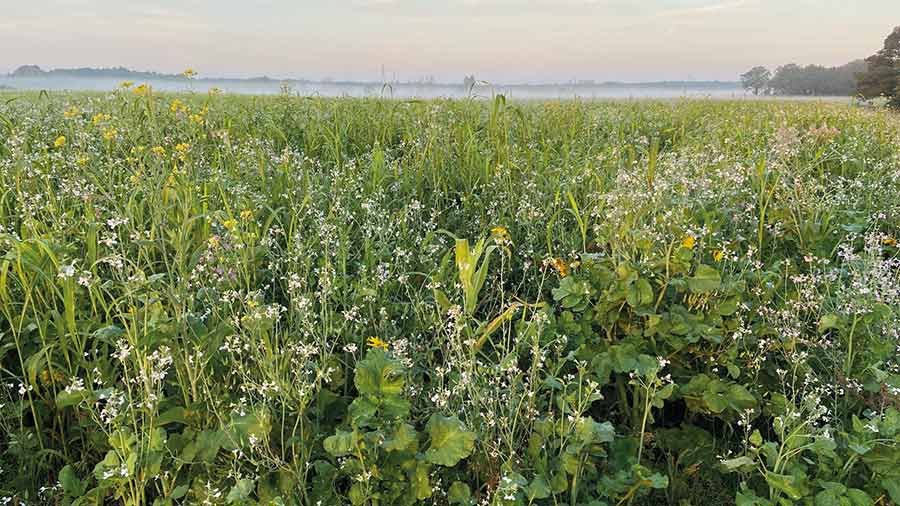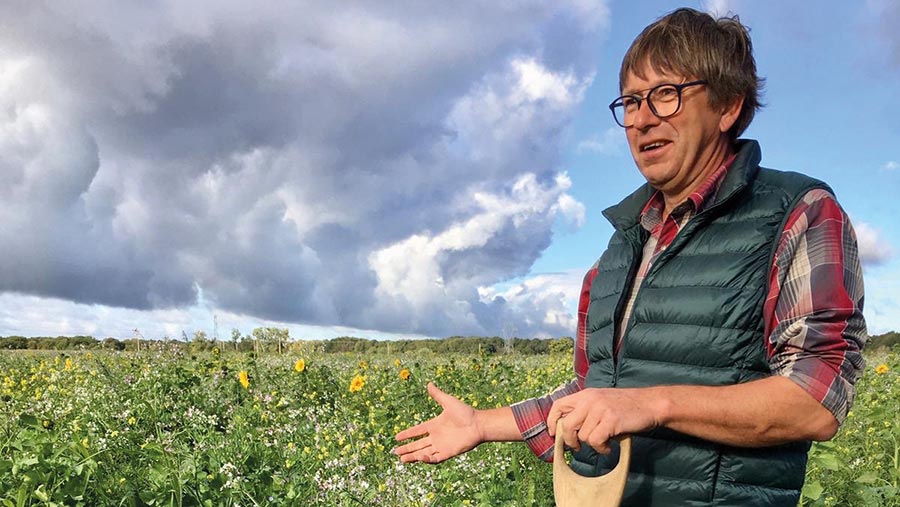French pioneer on how regen ag is key to many world problems
 © Agriculture de Conservation
© Agriculture de Conservation The regenerative agriculture bandwagon is gathering momentum, but farmers must remain in charge of its overall direction, believes a French pioneer.
Good farming practice has many of the solutions to the various crises that have been magnified by recent world events, according to Frédéric Thomas, a leading expert in conservation agriculture and co-founder of Base-France.
Whether it is energy shortages, food security concerns or climate change, overcoming these hurdles is already accelerating the pace of change on farms and prompting new ways of doing things, he says.
See also: Norfolk wheat grower turns digital for nitrogen benefits
“It’s increasingly being recognised that the solutions needed by the food industry and wider society come from good farming practice, such as you find in conservation agriculture and regenerative systems.”
Farming has come a long way in the past 20 years and there is now a far greater emphasis on soil management and biology, as well as the resilience it provides, stresses Mr Thomas.
As a result, on-farm innovation is happening all the time – mainly due to farmers getting together to share their knowledge and experience, rather than relying on commercial organisations or the science community to supply it.
“That’s a fundamental change,” he says. “Instead of inputs or techniques being the focus, it’s how they are used in a system that is key.”
Farmer control
Farmer groups or networks such as Base (biodiversity, agriculture, soils and environment) are very important if this innovation and adaptation is to continue, he says.
Mr Thomas points out that every country in the world is facing similar threats – from food, energy and fertiliser shortages to pollution problems and biodiversity collapse – all of which have been heightened by the war in Ukraine.
This makes farming’s ability to produce food, fibre, energy and biomass more important than ever, he continues, especially as the focus is on sustainability.
However, farms are complex biological systems, he points out, which require a better understanding of ecosystems, together with constant evolution.
Describing them as “living laboratories”, he says the farmer is responsible for synchronising the various system components.
“That doesn’t mean we don’t need scientists. They have a vital role in explaining how the tools are working, but it’s the farmer who puts these tools together as a system.”
He notes that there are three main areas that regenerative systems will have to address in the coming years.
1. What about big food?
The sudden interest in regenerative agriculture by food manufacturers and retailers does have some advantages, believes Mr Thomas.
“The fact these companies are all talking about it helps to raise the profile of these systems and creates demand,” he says.
“It also puts some distance between the farming industry and other labels, such as GM [genetically modified], which weren’t always seen as positive.”
Any promotion of the system by the food industry should include mention of all the components – cover crops, rotation, diversity, livestock – rather than the narrative focusing on the removal of one component such as tillage.
“Telling the right story will create difficulties for them,” he predicts.
“Regenerative agriculture is complex – the marketing departments of big food companies like to focus on simple things. There will be a lot of head scratching.”
He also questions what the food companies are going to bring to regenerative agriculture.
“If they want a share of the cake, they have to offer farmers something in return,” he says.
“If they don’t want to pay more, they will have to be clear about what their contribution is.”
2. What about standards/verification?
Applying measurements or verified standards to regenerative farming systems is fraught with difficulties and risks restricting farmer choice and stifling innovation, warns Mr Thomas.
Complex farming systems with a range of variables can produce better results for growers, consumers and the environment, which is what regulators and politicians should focus on, he believes.

© Agriculture de Conservation
“Farmers need to make this point. It isn’t the aims that matter, it’s what’s achieved, such as higher organic matter and better soil life.
“These are not black-and-white systems that are easy to measure.”
He is adamant that following an aims-focused approach will be disastrous for both productivity and the viability of farming, dismissing schemes that concentrate solely on farmers providing environmental services.
“You end up producing less, importing more and losing control of environmental and welfare standards. And you need more land to do all that on.”
3. What about the future?
The current world situation is forcing the pace of change, as the food production system faces up to the various crises and seeks solutions, says Mr Thomas.
“There is going to be a huge amount of progress made in a very short time. We already have the economy that we expected to encounter in 10 years’ time, not right now.”
Food prices will remain high for the foreseeable future, he believes, and farmers must retain the flexibility that they will need to improve the way they farm.
“Letting farmers choose how to achieve the best results is essential.
“That’s why we must be clear about the direction we wish to take and not give in to being told how to farm.”
A move to conservation agriculture
Frédéric Thomas, who was one of the founders of Base-France more than 20 years ago, reveals that the decision to adopt conservation agriculture on his farm in Sologne in central France was forced on him.
“I had no other way to keep farming,” he recalls. “The soils here are sand over clay, which were prone to erosion, and water management was very difficult. The economics weren’t working and the future looked bleak.”
Having worked and travelled in the US and Australia and seen how farmers were coping with similar extremes and constraints, he decided to look at different ways of farming.
Recognising the need to start with soil health, he has continued to adapt and evolve his farming system, bringing in diversity and livestock, with the aim of having greenery on the farm all the time.
A social strategy is also involved – he works with other farmers to share equipment and labour.
“It is more complicated,” he says. “We keep learning and adapting, sharing our findings and moving forward.”
Base-France has more than 1,200 members and covers more than 40,000ha in France.
Base-UK members’ conference
Frédéric Thomas will be speaking on both days of the Base-UK members’ conference on 7 and 8 February 2023, which takes place in Nottingham.
Having taken its inspiration from the French organisation, Base-UK will be marking its 10th anniversary at the conference, with a range of expert speakers on various topics.
Find out more about Frédéric Thomas and his conservation agriculture expertise

